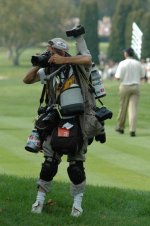And, I think, not necessarily a negative reflection. (I don't think that's your intent.) For a professional or a serious amateur who is driven to always try for the best shot, having alternatives at hand makes sense. If the lens you need is at home, you can't perform at your best.
If photography is an enjoyable hobby, and if that enjoyment is diminished by carrying a lot of hardware and the need to make choices, then it makes sense to avoid those things that make photography less fun. Sometimes you will miss the optimum shot, but that's not why you're out there.
I absolutely agree with your statements above.
My argument is only with the occasional post RFF seems to attract by someone who has 'discovered' that they shoot better when they
'force themselves' to only use a given lens or film or camera body or whatever; the implication is that they've stumbled over some rare universal truth - that less is more. And up goes the banner
"Less is More!" Less is not more, less is less. If I ride a bicycle with fewer gears than the one I own, I may find pleasure in it. I may find myself taking different routes than I might otherwise, to suit the capabilities or lack of them in the less-equipped bike. It does not mean
'less is more', however. It means
'less is different'. I could as easily taken the road less traveled by with the bike having more gears; but perhaps I did not think to do it. In this sense, having less may shake up the status quo. It does not alter the basic philosophy that less is less and more is more.
Once upon a time, I worked briefly as a salesman at a Radio Shack. My manager taught me something interesting. He told me never to put more than two items for comparison on the counter at a time. I thought it was to avoid having someone distract me and pocket one of them, but no. It was purely psychological. Many people are simply unable to make a purchasing decision if they have to choose between more than two items at the same time. They can compare TWO items, but put three on the counter and their brains lock up. I tested and found it generally to be true. This is purely anecdotal, but my thesis ever since has been that when people say they do better when given less, what it means is that they're not capable of dealing with more. I understand their problem, but it is their problem, not the fault of the equipment.
As has been noted in this thread, there are no absolutes. One may well find that certain lenses work well for certain types of work; taking other lenses would be added weight without providing any benefit. On the other hand, that does not mean that having found 'the' lens for a specific kind of work, it is the best lens for
'all' kinds of work, or that it is the 'best lens' for others doing the precise kind of work; since everyone has their own preferred methods. But that merely means that people have preferences, those preferences are based in their experience, and that's all well and good. It says nothing about whether or not
'less is more', just that carrying superfluous lenses is not terribly productive.
The core of the frequently-repeated statement is the assertion that one does better if one is
'forced' to make do with what would otherwise be an unacceptable choice. I reject this utterly. Whilst one may well have to become far more creative than one might otherwise be in terms of problem-solving when one is caught out with the
'wrong' lens for a given situation, that does not mean that they are of necessity a
'better photographer'. Instead it means that they are a
'different' photographer than they might otherwise be. As an exercise in creativity, it has much to recommend it. As a general practice, it's foolish and incorrect reasoning.

